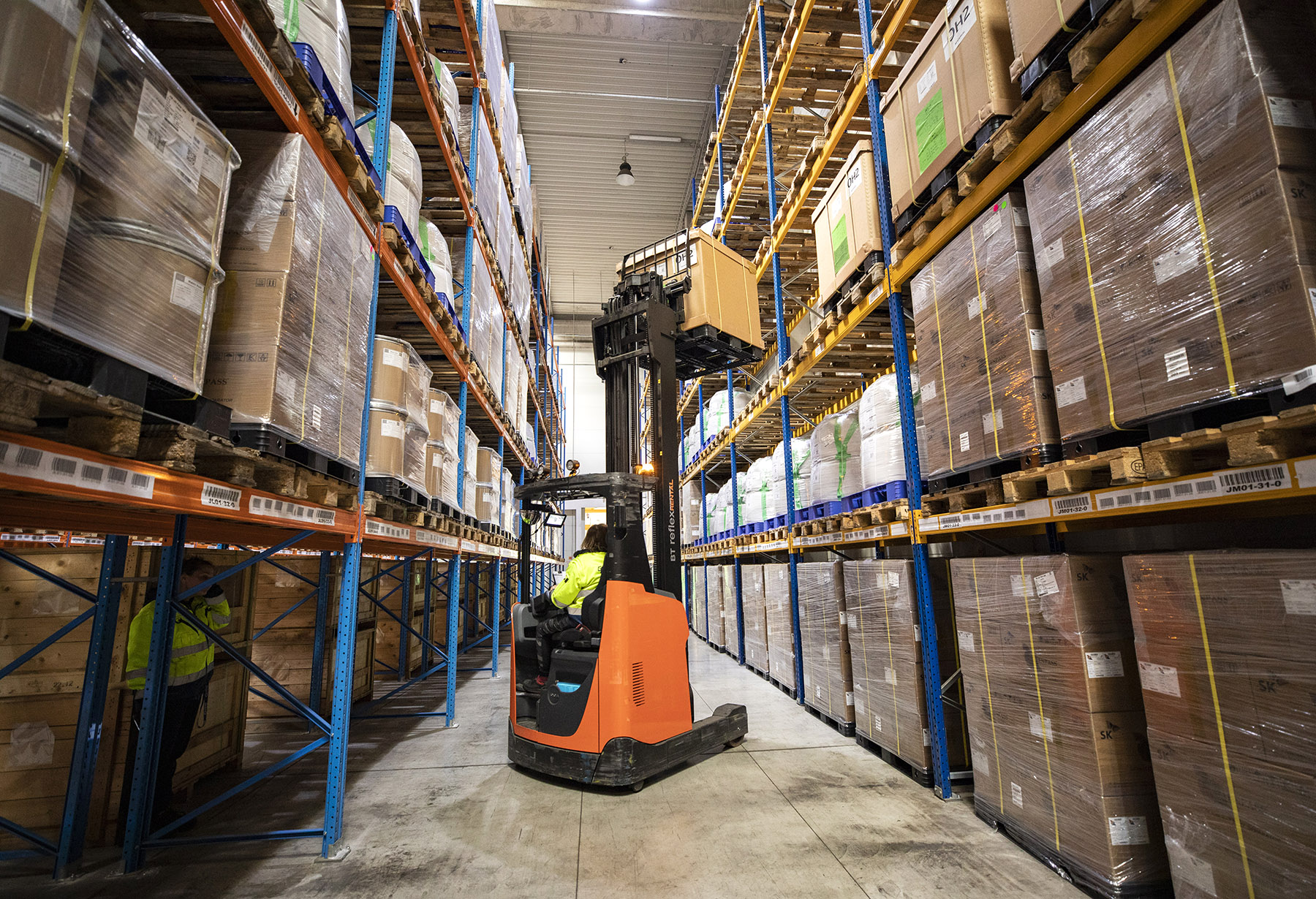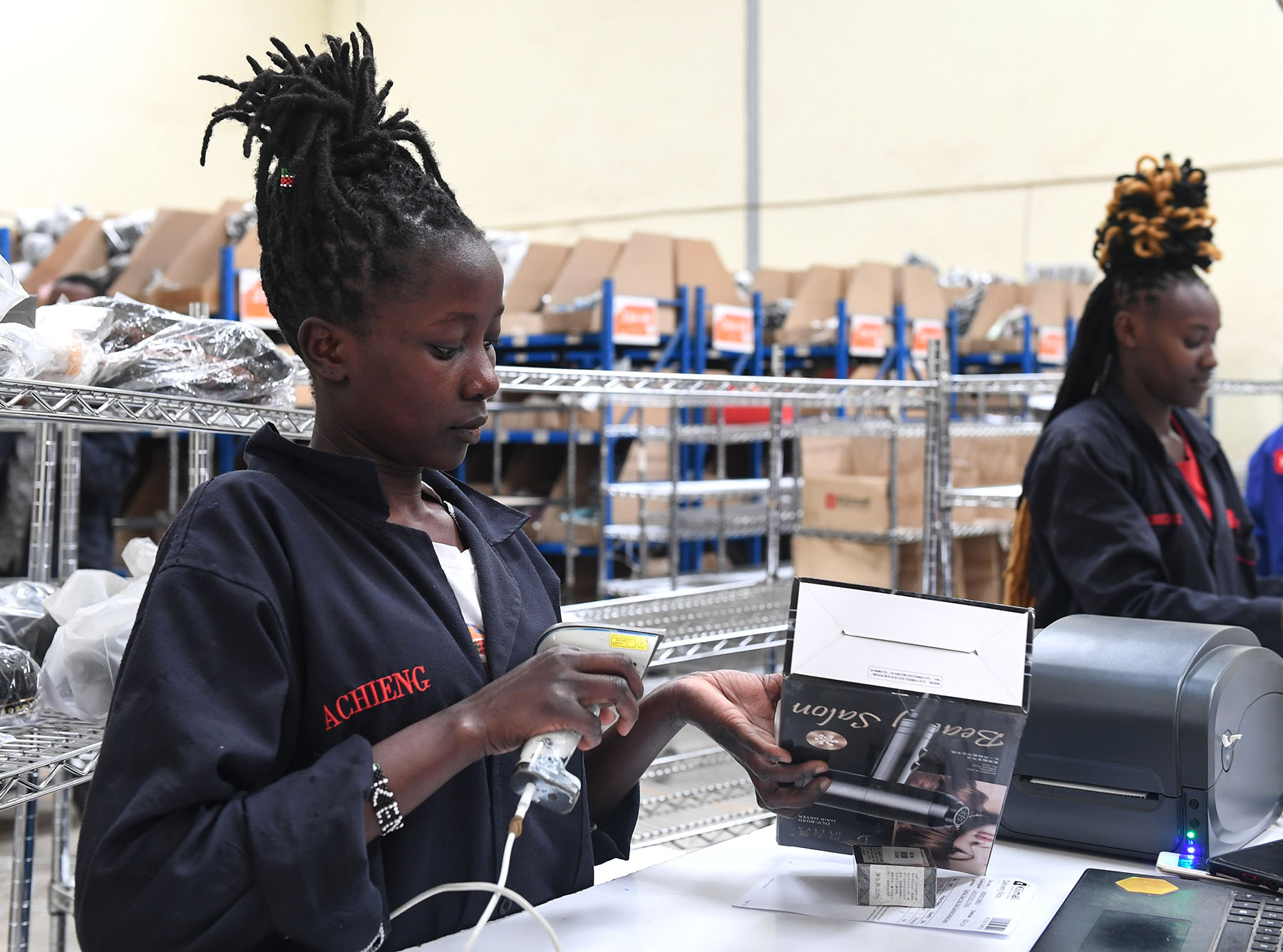Overseas warehouses, supply networks enhancing delivery efficiency, reducing costs and improving user experience

At a warehouse in Bremen, Germany, more than 100 automatic guided vehicles, or AGVs, are sorting goods following precise instructions.
These AGVs are able to deal with thousands of stock-keeping units covering hundreds of categories at this "intelligent" warehouse, owned by Cainiao Group, the logistics arm of Chinese tech heavyweight Alibaba Group Holding Ltd.
Covering an area of more than 40,000 square meters, it stores an array of Chinese-made products such as household appliances, electronic devices, auto components, furniture and outdoor equipment.
READ MORE: Cainiao expanding logistics network overseas
The highly automated warehouse leverages cutting-edge digital technologies like 5G, artificial intelligence, the internet of things and big data, as well as robotic arms.
This is aimed at increasing logistics efficiency, handling the surging number of parcels and overcoming manpower shortages during mega promotional campaigns.
Cainiao operates overseas warehouses covering more than 800,000 sq m across 18 countries and regions in Europe, Asia and North America.
Industry experts said the quick construction of overseas warehouses and global logistics networks is vital in enhancing delivery efficiency, reducing costs and improving user experience.
It is also useful in helping Chinese logistics companies expand their presence in overseas markets, ensuring the stability and security of supply chains, and meeting the growing demand for courier services from local consumers, they added.
Cainiao has developed its global logistics infrastructure by expanding its overseas distribution centers to 18, as well as by establishing overseas warehouses, and self-operated distribution and pickup facilities.
Wan Lin, CEO of Cainiao, said the company will expand its footprint in Europe, North America and Southeast Asia, further improve its global delivery services and deepen logistics capabilities in key overseas markets as part of its go-global push. It will also look to establish more warehousing and distribution centers abroad.
Cainiao has said it would expand its five-workday delivery guarantee for AliExpress — the business-to-customer platform of Alibaba that sells consumer goods to overseas markets — to encompass several prominent European markets.
With the inclusion of Spain, Portugal, France, Germany, the Netherlands, Belgium and the United Kingdom, Cainiao is enhancing the efficiency and reliability of cross-border e-commerce logistics in Europe.
This strategic expansion is in response to increased demand for faster and more reliable delivery services among European consumers, the company said.
By leveraging Cainiao's technology and extensive logistics network, AliExpress sellers in China can offer their customers in these markets a faster delivery experience within five working days.
"Europe remains a key focus for us as we continue to enhance our global logistics infrastructure and optimize delivery solutions for our customers," said Wan.
The expansion of the five-workday delivery solution to these additional European markets reflects Cainiao's commitment to providing faster and more efficient cross-border logistics services, he added.

Cainiao first unveiled such a delivery service in September 2023 in four European markets — Spain, the UK, the Netherlands and Belgium. The service has since expanded to Germany, France and Portugal in close cooperation with local partners at every link of the logistics process.
Lu Zhenwang, CEO of Shanghai-based Wanqing Consultancy, said the move to invest in global logistics infrastructure and overseas warehouses will enhance the competitiveness of Chinese foreign trade enterprises, facilitate the development of the cross-border e-commerce sector and bolster sales of Chinese products overseas.
China's cross-border e-commerce industry has seen robust growth in recent years, with the sector's import and export scale reaching 1.22 trillion yuan ($171.5 billion) in the first half of this year, up 10.5 percent year-on-year, data from the General Administration of Customs showed.
Industry insiders said cross-border e-commerce is key to boosting the development of China's foreign trade, while overseas warehouses, which usually apply AI-powered algorithms to schedule warehouse pick-ups and facilitate manual parcel sorting, have become a new type of foreign trade infrastructure to support cross-border e-commerce and expand the international market.
The development of overseas warehouses has been high on the government's agenda.
According to a guideline issued by the Ministry of Commerce and other government departments recently, China will advance the construction of overseas warehouses and expand cross-border e-commerce exports, so as to accelerate the cultivation of new growth drivers for foreign trade.
Data from the Ministry of Commerce showed that the number of overseas warehouses has surpassed 2,500 so far, covering a total area of over 30 million sq m. More than 1,800 are specifically dedicated to serving the needs of cross-border e-commerce, with a combined area surpassing 22 million sq m.
Chinese online retailers are accelerating steps to enter overseas markets to seek new sources of revenue amid fierce competition in the domestic market, said Zhang Zhouping, a senior analyst of business-to-business and cross-border activities at the Internet Economy Institute.
"Overseas warehouses serve as vital infrastructures that boost growth in the nation's cross-border e-commerce sector," Zhang said.
Such facilities enable quicker Customs clearance, faster delivery and lower costs, Zhang added.
By shipping goods in bulk to overseas warehouses, companies can better manage inventory, and quickly adjust logistics and distribution strategies based on market demand and changes in customer preferences, he said.
JD Logistics, an arm of Chinese e-commerce giant JD, is also accelerating the construction of global logistics infrastructure. It plans to build more overseas warehouses in the Americas, Europe, Southeast Asia, Australia and the Middle East, where Chinese enterprises are accelerating steps to expand their business volume with e-commerce penetration rates continuing to rise.
So far, the company has launched self-operated overseas warehouses in the United States, the United Arab Emirates, Germany, the Netherlands, France, the UK, Southeast Asia, the Middle East and Australia.
As of end-June, JD operated nearly 100 bonded warehouses, international direct-mail warehouses and overseas warehouses, covering an aggregated floor area of about 1 million sq m.
Ji Jie, general manager of international warehousing and distribution at JD Logistics, said, "As key infrastructure in the new form of foreign trade, overseas warehouses can alleviate uncertainties in global supply chains and drive high-quality growth of foreign trade."
Ji underscored the importance of speeding up the construction of overseas warehouses in helping cross-border e-commerce platforms boost delivery efficiency, reduce logistics costs and improve user experience.
Chinese enterprises are facing mounting uncertainties, such as fluctuations in the shipping and air cargo market, Ji said.
Moreover, intelligent logistics technologies, ranging from automatic sorting robots to driverless vehicles, have been used in overseas warehouses to improve delivery efficiency and reduce operational costs, she added.
JD has also inked a strategic partnership with France-based Geopost, Europe's largest international parcel delivery network. This collaboration enables prompt local delivery from JD's overseas warehouses, with one-day delivery possible in countries such as Germany, Poland, the Netherlands, France, the UK and Spain.
To enhance cross-border delivery capabilities, Chinese logistics firms have also invested heavily in providing air cargo services. SF Airlines, the aviation branch of logistics giant SF Express, has expanded its freighter fleet to 87 aircraft.
ALSO READ: Cross-border e-commerce shows solid uptrend
SF Airlines said it is committed to continuously enhancing its international air cargo transport capacity and launching more routes.
China's first dedicated freight airport, Ezhou Huahu Airport in Ezhou, Hubei province, began operations in July 2022. SF Express holds a 46 percent stake in Hubei International Logistics Airport Co Ltd, the operator of Ezhou Huahu Airport.
To date, it has cultivated an international route network from Ezhou to destinations in Europe, North America, the Middle East, South Asia, Southeast Asia and East Asia.
SF Airlines recently launched an international air cargo route linking Shenzhen, Guangdong province, and Sanya, Hainan province, with Singapore.
Goods meant for export collected from across the country will be sent to Singapore via this route. Subsequently, imported goods will be sent to Sanya, according to the cargo carrier.
Cargo aircraft operations are vital supplements to logistics companies' supply chains and delivery systems, as airfreight transportation can forge a greater synergy with warehousing and sorting centers to build an integrated logistics and delivery network, said Han Tao, a researcher at the China Air Transport Association.
Yang Daqing, deputy director of research at the China Federation of Logistics and Purchasing, said developing an international airfreight business will help enterprises boost long-haul freight capacity and further improve the efficiency of cross-border express delivery.


